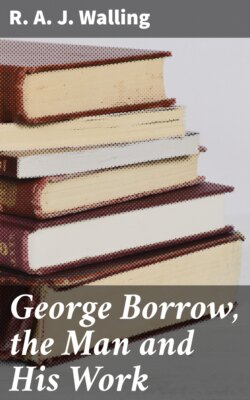Читать книгу George Borrow, the Man and His Work - R. A. J. Walling - Страница 3
На сайте Литреса книга снята с продажи.
PREFACE
ОглавлениеTable of Contents
One writing of Borrow since the publication of Dr. W. I. Knapp’s “Life, Writings, and Correspondence of George Borrow” (Murray, 1899) must of need acknowledge the invaluable services conferred upon the student by that monumental work. Its store of documents is the harvest of a lifetime of devoted labour, and it bridges many a yawning gulf which aforetime left the Borrovian explorer disconsolate. In this monograph, where Dr. Knapp is directly quoted, the fact is generally mentioned either in the text or by way of footnote; but it seemed fitting that there should be some more definite expression of my indebtedness to his affectionate diligence in those long and fruitful researches, which alone have made possible a consecutive story of Borrow’s life.
An inquiry into the Cornish origin of the Borrow family, into the circumstances of Borrow’s visit to the home of his forbears, and of his tour in Cornwall, was responsible for the inception of the present book. The astonishing contrast between the Borrow of the common conception and Borrow as he really was in the flesh and in the spirit gradually forced itself upon me. Borrow has been popularly regarded in two lights. Many people have had a vague idea that if he was not a gypsy he was “half a gypsy, or something of the sort.” More instructed opinion has accepted his affection for East Anglia, the country of his birth, and his glorification of Anglo-Saxonism, as sufficient evidence that he was himself an Anglo-Saxon. Both views are wrong. He was of Celtic origin; his genius was Celtic, though its attributes were modified by many influences. Here is the explanation of many things in Borrow’s life and work which can be explained in no other way. If the part of the book referring to his Cornish associations appears to be out of proportion to the rest, my excuse lies here also.
Further, the Cornish episodes are those least known in Borrow’s life. My object has been, so far as the narrative is concerned, to strengthen the connecting links between those portions of his career which he set forth in his autobiographies, rather than to re-traverse ground where he himself trailed the pen.
Gratitude must be expressed for much assistance given to me in the elucidation of obscure points and in the tracing of documents. First, I am indebted to Mr. Theodore Watts-Dunton, not only for liberty to draw upon his rich store of recollections of his friend, but for much advice, assistance, and suggestion, the value of which it is difficult to overestimate. No little of the revival of interest in Borrow and the subjects with which he dealt is due to the vogue given to “gypsyism” in literature by the extraordinary success of that wonderful novel, “Aylwin,” and the fascinations of its heroine, Sinfi Lovel, of whom Mr. Watts-Dunton and Borrow conversed during those walks commemorated in Dr. Gordon Hake’s sonnet:
While he, Lavengro, towering by your side,
With rose complexion and bright silvery hair,
Would stop amid his swift and lounging stride
To tell the legends of the fading race—
As at the summons of his piercing glance,
Its story peopling his brown eyes and face,
While you called up that pendant of romance
To Petulengro with his boxing glory,
Your Amazonian Sinfi’s noble story!
Mr. Francis Edwards, of Marylebone, has generously given permission for the reproduction of exceedingly interesting passages from unique copies of Borrow’s books in his possession. To the kindness of Mrs. Ford, of Pencarrow, is due some of the additional information about the relations of Borrow with her husband, Richard Ford. For East Anglian memories I have consulted, among others, Mr. William Dutt, of Lowestoft, and Mr. William Mackay, of Oulton. Family documents and reminiscences have been contributed by Mr. W. H. Borrow, of South Hampstead; Mr. E. Pollard, of Penquite; Mr. William Pollard, of Woolston, and, above all, by Dr. Reginald Taylor, of Gray’s’ Inn Road (son of the “gallant girl” of the ’fifties in Cornwall), to whom my thanks are due especially for the material of the detailed account of Borrow’s Cornish tour.
In the biographical sense, the most important new matter is the correspondence between Borrow and Sir John Bowring, supplied by the courtesy of Sir John’s sons, Mr. Lewin B. Bowring, of Torquay, and Mr. F. H. Bowring, of West Hampstead. This throws a little light on the mysterious “Veiled Period.” The quarrel between Borrow and Bowring will possibly never be explained quite fully; the correspondence now summarised or printed for the first time shows that for more than twenty years Bowring was a good friend of Borrow—“my only friend,” as he said in 1842. Judgment on the merits of the dispute, so far as the evidence can be taken at present, must go against Borrow.
I have entered with some diffidence upon the discussion of Borrow’s “gypsyism”; any degree of confidence which may appear is the offspring of the enthusiastic aid afforded to me by Mr. R. A. Scott-Macfie, the secretary of the Gypsy Lore Society.
R. A. J. W.
Plymouth,
October, 1908.
